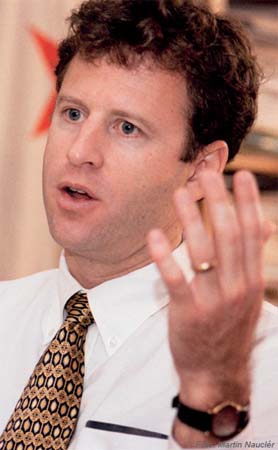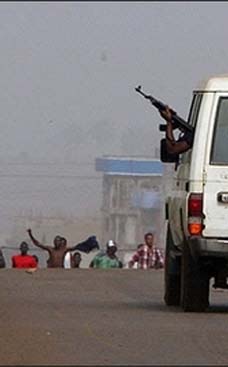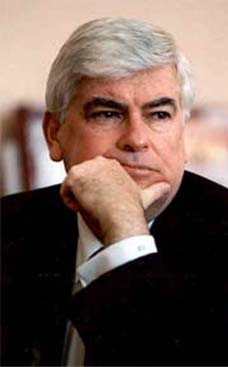2006.03.27: March 27, 2006: Headlines: COS - Congo Kinshasa: Iraq: Speaking Out: Washington Post: Congo Kinshasa RPCV Michael O'Hanlon writes: How to Stop a Civil War in Iraq
Peace Corps Online:
Peace Corps News:
Library:
January 23, 2005: Index: PCOL Exclusive: Iraq, War in Iraq :
Peace Corps: Iraq: Archived Stories:
2006.03.27: March 27, 2006: Headlines: COS - Congo Kinshasa: Iraq: Speaking Out: Washington Post: Congo Kinshasa RPCV Michael O'Hanlon writes: How to Stop a Civil War in Iraq
Congo Kinshasa RPCV Michael O'Hanlon writes: How to Stop a Civil War in Iraq

"In his statements about letting Iraqis handle their own civil strife, perhaps Rumsfeld was trying to drive home to Iraqis the message that they should not count on the distant American superpower to bail them out if civil war begins. This message is grounded in a sound logic; Iraqis do need to step up to the plate and solve more of their own problems. But as a full indication of what our military plans would be for any incipient civil war, it is not the right strategy. Now is the time to reassess."
Congo Kinshasa RPCV Michael O'Hanlon writes: How to Stop a Civil War in Iraq
How to Stop a Civil War
By Michael O'Hanlon
Monday, March 27, 2006; Page A15
Administration officials have been right in recent weeks to argue that there is no large-scale civil war underway in Iraq. As long as the Iraqi political leadership remains generally united in trying to calm the situation, and as long as sectarian violence remains more sporadic than strategic (with no systematic ethnic cleansing, for example), true civil war remains a threat rather than a reality. But as President Bush himself recognized in his March 13 speech on Iraq, whoever attacked the Golden Mosque in Samarra on Feb. 22 was trying to spark a civil war. Yesterday's gruesome events, including the discovery of 30 beheaded bodies near Baqubah, heavy fighting in parts of Baghdad and the firing of fatal mortar rounds at Moqtada al-Sadr's compound in Najaf, suggest that such attempts will likely continue.
Of course, preventing a civil war is primarily a political task. In this light, U.S. Ambassador Zalmay Khalilzad has been right to push Iraqis to form a coalition government. He might also encourage them to start thinking about what policies such a government would pursue. For example, in debating whether Prime Minister Ibrahim al-Jafari should retain his post, Iraqis might think a bit less about the past year and instead ask Jafari about his plans for the future: for sharing oil revenue among provinces, rehabilitating lower-level Baathists to reenter the society, integrating security forces and creating jobs.
But if the political process continues to falter and the risk of civil war looms larger, we will also need a military plan for quelling it. Much of the American debate has been asking how to handle an all-out conflict in which Iraq has already fractured and violence is rampant. But the more important question is how to quell violence in the early stages, before such a scenario develops fully. And this is not the typical debate over how fast and soon we can draw down U.S. troops in Iraq; rather, it is a debate about what they do while they are there.
On this point, initial indications are that American thinking is on the wrong track. Defense Secretary Donald Rumsfeld has stated that U.S. forces would not become heavily involved in any civil strife, leaving it instead to Iraqis to sort out the problem. This approach, which mirrors the relatively passive approach U.S. troops took to the reprisal violence after the Feb. 22 bombing, has an understandable appeal. But it is akin to our decision to stand aside and allow wanton looting after Saddam Hussein fell in April 2003, and it could have comparably disastrous consequences.
If civil war begins in Iraq, it will probably consist of increasingly active vigilante justice -- as well as random, pointless acts of violent rage -- by Iraq's powerful militias. They will attack defenseless mosques, homes of important figures from other ethnic and religious groups, and defenseless citizens. They will begin to perpetrate ethnic cleansing with cold, premeditated purpose. As time goes on, hearing about similar behavior by other militias from other sectarian groups, they will also be motivated by a desire for vengeance -- not just for Hussein's atrocities of yesteryear but for what happened last week and last night. And they will seek to protect their own unarmed families and friends by stepping up ethnic cleansing in neighborhoods where they live, to preclude the possibility of further attacks against their own kin.
These are the typical dynamics of civil conflicts, as analyzed by scholars such as John Mueller, Barry Posen, Steve Stedman and Chaim Kaufmann. Civil wars with a heavy ethnic dimension do not typically begin as full-blown conflicts but rather develop an internal dynamic in which hate, rage and fear increasingly influence the actions of a growing number of people.
In such a situation, stemming violence early is critical. Checkpoints need to be manned, curfews enforced, vigilantes arrested or shot, mosques and schools and hospitals protected.
Yes, Iraqi forces can do many of these things and should. And, yes, many of them will. But Iraqi security forces are at present politically untested. Most units are dominated by one group or another. If the country begins to descend toward civil war, the temptation of many will be to take sides in the sectarian strife rather than stop it.
The foreign coalition can do a great deal to discourage this. By deploying with Iraqi police and army troops on the streets, it can provide enough manpower to do the labor-intensive work required to restore order as anarchy begins to spread. It can help give Iraqi security forces the backbone they need to hang together and do their job for the country rather than fight for their Kurdish or Shiite or Sunni Arab interests. It can act as a glue, helping to hold them together by working with them and providing an example worthy of emulation.
In his statements about letting Iraqis handle their own civil strife, perhaps Rumsfeld was trying to drive home to Iraqis the message that they should not count on the distant American superpower to bail them out if civil war begins. This message is grounded in a sound logic; Iraqis do need to step up to the plate and solve more of their own problems. But as a full indication of what our military plans would be for any incipient civil war, it is not the right strategy. Now is the time to reassess.
The writer is a senior fellow at the Brookings Institution.
Links to Related Topics (Tags):
Headlines: March, 2006; Peace Corps Congo Kinshasa; Directory of Congo Kinshasa RPCVs; Messages and Announcements for Congo Kinshasa RPCVs; Iraq; Speaking Out
When this story was posted in February 2007, this was on the front page of PCOL:





Peace Corps Online The Independent News Forum serving Returned Peace Corps Volunteers
 | Ron Tschetter in Morocco and Jordan
On his first official trip since being confirmed as Peace Corps Director, Ron Tschetter (shown at left with PCV Tia Tucker) is on a ten day trip to Morocco and Jordan. Traveling with his wife (Both are RPCVs.), Tschetter met with volunteers in Morocco working in environment, youth development, health, and small business development. He began his trip to Jordan by meeting with His Majesty King Abdullah II and Her Majesty Queen Rania Al Abdullah and discussed expanding the program there in the near future. |
 | Chris Dodd's Vision for the Peace Corps
Senator Chris Dodd (RPCV Dominican Republic) spoke at the ceremony for this year's Shriver Award and elaborated on issues he raised at Ron Tschetter's hearings. Dodd plans to introduce legislation that may include: setting aside a portion of Peace Corps' budget as seed money for demonstration projects and third goal activities (after adjusting the annual budget upward to accommodate the added expense), more volunteer input into Peace Corps operations, removing medical, healthcare and tax impediments that discourage older volunteers, providing more transparency in the medical screening and appeals process, a more comprehensive health safety net for recently-returned volunteers, and authorizing volunteers to accept, under certain circumstances, private donations to support their development projects. He plans to circulate draft legislation for review to members of the Peace Corps community and welcomes RPCV comments. |
 | He served with honor
One year ago, Staff Sgt. Robert J. Paul (RPCV Kenya) carried on an ongoing dialog on this website on the military and the peace corps and his role as a member of a Civil Affairs Team in Iraq and Afghanistan. We have just received a report that Sargeant Paul has been killed by a car bomb in Kabul. Words cannot express our feeling of loss for this tremendous injury to the entire RPCV community. Most of us didn't know him personally but we knew him from his words. Our thoughts go out to his family and friends. He was one of ours and he served with honor. |
 | Peace Corps' Screening and Medical Clearance
The purpose of Peace Corps' screening and medical clearance process is to ensure safe accommodation for applicants and minimize undue risk exposure for volunteers to allow PCVS to complete their service without compromising their entry health status. To further these goals, PCOL has obtained a copy of the Peace Corps Screening Guidelines Manual through the Freedom of Information Act (FOIA) and has posted it in the "Peace Corps Library." Applicants and Medical Professionals (especially those who have already served as volunteers) are urged to review the guidelines and leave their comments and suggestions. Then read the story of one RPCV's journey through medical screening and his suggestions for changes to the process. |
 | The Peace Corps is "fashionable" again
The LA Times says that "the Peace Corps is booming again and "It's hard to know exactly what's behind the resurgence." PCOL Comment: Since the founding of the Peace Corps 45 years ago, Americans have answered Kennedy's call: "Ask not what your country can do for you--ask what you can do for your country. My fellow citizens of the world: ask not what America will do for you, but what together we can do for the freedom of man." Over 182,000 have served. Another 200,000 have applied and been unable to serve because of lack of Congressional funding. The Peace Corps has never gone out of fashion. It's Congress that hasn't been keeping pace. |
 | PCOL readership increases 100%
Monthly readership on "Peace Corps Online" has increased in the past twelve months to 350,000 visitors - over eleven thousand every day - a 100% increase since this time last year. Thanks again, RPCVs and Friends of the Peace Corps, for making PCOL your source of information for the Peace Corps community. And thanks for supporting the Peace Corps Library and History of the Peace Corps. Stay tuned, the best is yet to come. |
 | History of the Peace Corps
PCOL is proud to announce that Phase One of the "History of the Peace Corps" is now available online. This installment includes over 5,000 pages of primary source documents from the archives of the Peace Corps including every issue of "Peace Corps News," "Peace Corps Times," "Peace Corps Volunteer," "Action Update," and every annual report of the Peace Corps to Congress since 1961. "Ask Not" is an ongoing project. Read how you can help. |
Read the stories and leave your comments.

Some postings on Peace Corps Online are provided to the individual members of this group without permission of the copyright owner for the non-profit purposes of criticism, comment, education, scholarship, and research under the "Fair Use" provisions of U.S. Government copyright laws and they may not be distributed further without permission of the copyright owner. Peace Corps Online does not vouch for the accuracy of the content of the postings, which is the sole responsibility of the copyright holder.
Story Source: Washington Post
This story has been posted in the following forums: : Headlines; COS - Congo Kinshasa; Iraq; Speaking Out
PCOL35032
47



















